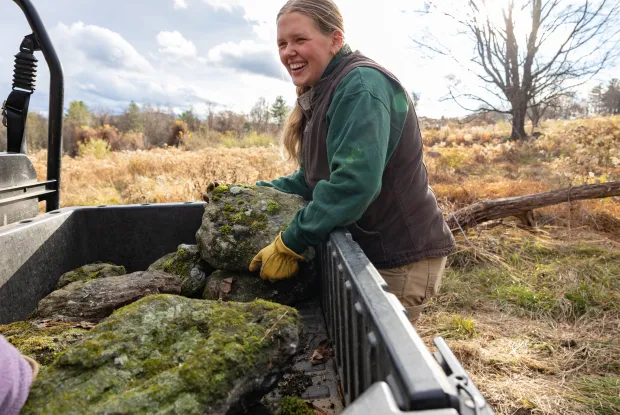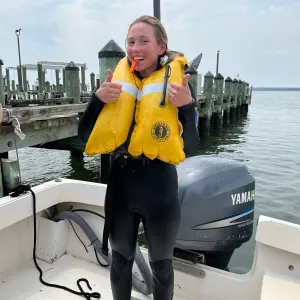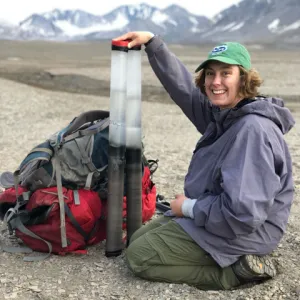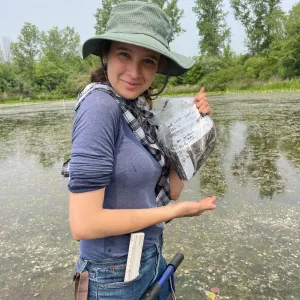
Environmental Science & Policy
The need has never been greater for individuals who can address increasingly complex environmental issues. The Environmental Science and Policy (ES&P) Program seeks to produce future leaders with interdisciplinary analysis and problem-solving skills. ES&P majors work in teams to address sustainability projects on campus or with local community partners. During the summer as well as the academic year, students can conduct research with the ES&P program faculty whose work spans the natural sciences, social sciences and humanities. During the summer, ES&P also supports students participating in the NOAA College-Supported Internship Program.
Department Updates
Events Calendar
Visit the Center for the Environment’s Events Calendar for even more events of interest taking place at Smith, within the Five Colleges, and in the local community.
For students interested in declaring the major, please be aware that as of November 1, 2025, we have modified our requirements.
Requirements & Courses
Goals for Majors in Environmental Science and Policy
By the time they graduate, environmental science and policy majors should be able to:
- Understand interconnected earth, ecological, and human/societal phenomena and processes that influence human-environment interactions
- Use systems thinking to understand how to plan and design social-ecological structures and policies
- Recognize and address intersecting concerns of social and environmental justice
- Integrate disciplinary knowledge and methods and identify underlying assumptions when approaching environmental problems
- Collect, analyze and interpret relevant data and information
- Synthesize information and communicate effectively with diverse audiences and across differences
- Work collaboratively to translate knowledge into meaningful environmental action
Environmental Science and Policy Major
Prospective majors should consult with a faculty adviser in choosing their courses. In their first semesters, students are encouraged to enroll in one of the foundational courses and ENV 101, as well as statistics.
Requirements
Fourteen courses:
- Four environmental integration courses: ENV 101, ENV 201/ENV 202, ENV 311, and ENV 312
- Five foundational courses:
- Two courses from different departments in the natural sciences (BIO, CHM, GEO or PHY), one of which must be a lab course.
- Natural science lecture courses: BIO 130, CHM 108/ ENV 108, GEO 101, GEO 104, or PHY 110.
- Natural science lab or field courses: BIO 131, CHM 111, CHM 118, GEO 102, or GEO 108.
- Two courses in social sciences, humanities or policy from different departments: ANT 130, ANT 224/ ENV 224, ECO 150, ENV 218, WRT 118 (select topics), WRT 119 (select topics), ENG 135/ WRT 135 (select topics), FYS 151, GOV 200, GOV 207, GOV 220, GOV 241, LAS 201 (select topics), LSS 255, PHI 238, PPL 220, SOC 101 or SWG 150.
- A fifth course in either the natural sciences or SSHP, or a quantitative/research methods course. EGR 100 (with an environmental focus) or the 2-credit stand-alone laboratory GEO 102 may be used for the fifth course. The fifth course must be in a different discipline from the other four courses being counted towards the foundational course requirement.
- Two courses from different departments in the natural sciences (BIO, CHM, GEO or PHY), one of which must be a lab course.
- One course in statistics: ECO 220, GOV 203, PSY 201, SDS 210, or SOC 204. Students with qualifying test scores (e.g., AP, IB, etc.) in statistics may substitute an appropriate upper-level statistics course in consultation with the major adviser and in accordance with the guidelines of the home department.
- Four electives that create a coherent sequence with a clear environmental focus, chosen in consultation with the major adviser; the focus may be specific to a discipline, topic or location.
- See Crosslisted Courses for options.
- Several colloquium and seminar courses have rotating themes; approval is granted for years when the focus is on environment and sustainability topics.
- No more than one elective may be at the 100 level.
- At least one must be at the 300 level.
- ENX 100 may not be used as an elective.
- One semester of independent study, ENV 400 (taken for 3 or 4 credits), or credit toward an honors thesis, ENV 430D, may be substituted for one elective, but neither may count as the 300-level elective.
Major Requirement Details
- Only one course fulfilling the major requirements may be taken S/U; ENV 201/ENV 202, ENV 311 and ENV 312 may not be taken S/U.
- You can use an AP credit (4 or 5) to substitute for a foundational course in order to take an appropriate upper-level course in the same subject (in accordance with guidelines of the home department); an AP credit does not itself satisfy a foundational course requirement.
- Electives and the environmental focus can be identified at the time the major is declared but not later than the end of the add/drop period of the first semester of junior year. Subsequent changes require approval of the major adviser.
- Electives can include, but are not limited to, the crosslisted courses on the courses tab. Other relevant courses offered at Smith, within the Five College Consortium or in study-away programs, may be used to satisfy the electives requirement of the major with approval of the major adviser.
- Internships, study-abroad or Praxis experiences are encouraged.
Honors
Students with a strong academic background who wish to conduct independent and original work on an environmental topic are encouraged to pursue an honors project. Interested students should contact potential honors advisers by the beginning of February in the spring semester of their junior year. Please consult the director of honors for specific requirements and application procedures.
Environmental Science and Policy Minor
Prospective minors are urged to meet with the chair, associate director, or faculty adviser early in their academic planning.
Requirements
Six courses (chosen with the guidance and approval of an ENV adviser).
- ENV 101
- Two courses from different areas in the natural sciences
- Biological sciences: BIO 130, BIO 266/BIO 267, BIO 268/BIO 269, BIO 364/BIO 365, BIO 390 (select topics)
- Chemistry: CHM 108/ ENV 108, CHM 346, GEO 301
- Geosciences: GEO 101, GEO 104, GEO 108, GEO 301
- Physics and Engineering: EGR 100 (select topics), EGR 312, EGR 315, PHY 110
- One course from social science, humanities and policy: ANT 224/ ENV 224, ANT 229, ECO 224, ECO 271, ENV 323, ENV 326, ENV 327, GOV 207, GOV 242, GOV 347 (select topics), PHI 238, PSY 268, SOC 233
- Two electives: ENV 201/ENV 202, ENV 311, courses listed above for the minor in the natural sciences or social science, humanities and policy categories, or other courses in consultation with the minor adviser.
Minor Requirement Details
- ENX 100 may not be used as an elective
- Two of the required courses must be 200 level or higher.
- Only topics of EGR 100 that focus on energy, natural resources or sustainability may count toward the minor.
- ENV 201/ENV 202 and ENV 311 may count as electives toward the minor but do not fulfill either the natural science or the social science and humanities requirements.
- A course in geographic information systems, ENV 150/ GEO 150 or equivalent, is recommended as an elective.
- Appropriate Smith courses, Five College courses, or courses taken at other institutions and through summer and semester-away programs may be counted toward the minor with preapproval of the adviser.
- Students must satisfy the prerequisites for all courses included in their minor program.
- No more than three of the six courses may be taken at other institutions.
- No more than one course may be taken S/U; ENV 101 may not be taken S/U.
Courses
ENV 101 Sustainability and Social-Ecological Systems (4 Credits)
Earth has entered a new geological epoch, the Anthropocene, characterized by the accelerating impact of human activities on the Earth’s ecosystems. All over the globe, humans have transformed the environment and have sometimes created catastrophic dynamics within social-ecological systems. Scientists have studied these phenomena for decades, alerting both the general public and policy-makers of the consequences of human actions. However, despite convincing evidence of environmental degradation, humans continue to radically transform their environment. This course explores this puzzle and asks how social-ecological systems can be remodeled to build a more sustainable and resilient future. Enrollment limited to 50. Natural Science; Social Science; Historical Studies
Fall, Spring
ENV 113 Colloquium: Organic, Mechanical and Digital Environments (4 Credits)
Beginning in the late 20th century, human organization and experience has increasingly been influenced by digital forms of communication, production, and integration with the environment. This is an environmental, technological, social landscape that will likely dominate the rest of people's lives, but how can people responsibly accept or use it without putting it in context with other forms of technology and communities? The course examines life and the relationship to nature in organic, mechanical and digital societies in order to understand the following: 1) How technology influences different types of people and 2) How technological change can be linked to social transformations. Because technology and its effects on society are multifaceted, the course draws from several disciplines. Sources from historians, anthropologists, sociologists, philosophers, political scientists and ecologists are used to reconstruct these worlds and place this world in a clearer context. Enrollment limited to 18. Social Science
Fall, Spring, Variable
ENV 150/ GEO 150 Mapping our World: An Introduction to Geographic Information Systems (4 Credits)
Offered as GEO 150 and ENV 150. A geographic information system (GIS) enables data and maps to be overlain, queried and visualized in order to solve problems in many diverse fields. This course provides an introduction to the fundamental elements of GIS and applies the analysis of spatial data to issues in geoscience, environmental science and public policy. Students gain expertise in ArcGIS--the industry standard GIS software--and online mapping platforms, and carry out semester-long projects in partnership with campus offices or local conservation organizations. Enrollment limited to 20. Natural Science
Fall
ENV 200 Colloquium: American Indians, Tribes, and Environmental Issues in the American Southwest (3 Credits)
This course focuses on the lives of American Indians and the environment at different scales. Students visit communities in Arizona and explore the political, cultural, economic and social activities from American Indian perspectives. With the partnership of the University of Arizona’s School of Anthropology, students attend lectures from experts in the field that cover: the origins of American Indians in the Southwest; traditional and modern agricultural practices; archaeological evidence for land and water use; the effects of colonialism on people and land; religions and the environment among American Indians; water rights at the state, national and international levels; and contemporary issues for tribes. The lectures complement the field excursions to tribes and organizations in the region. Enrollment limited to 14. Instructor permission required. (E) Social Science
Interterm, Alternate Years
ENV 201 Researching Environmental Problems (4 Credits)
While focusing on topical environmental issues, students learn how to gather, analyze and present data using methods from the natural and social sciences. Data are drawn from multiple sources, including laboratory experiments, fieldwork, databases, archival sources, surveys and interviews. Emphasis is on quantitative analysis. Environmental topics vary in scale from the local to the global. Corequisite: ENV 202. Prerequisite: ENV 101. Enrollment limited to 18. Natural Science; Social Science
Fall, Spring
ENV 202 Researching Environmental Problems Laboratory (1 Credit)
In this laboratory complement to ENV 201, students use a variety of methods to gather and analyze different types of environmental data (quantitative, qualitative, spatial). Corequisite: ENV 201. Prerequisite: ENV 101. Enrollment limited to 18. Natural Science; Social Science
Fall, Spring
ENV 215 Introduction to Environmental Policy Analysis (4 Credits)
How is actionable advice to decision makers about how to address environmental challenges best provided? What makes a policy effective or desirable? How are policy analysis documents best evaluated? This course introduces the frameworks and methodologies of environmental policy analysis. Working from a step-by-step approach to policy analysis, students practice defining problems, identifying policy alternatives, selecting appropriate evaluation criteria and producing well-supported policy recommendations. The course explores the strengths and limitation of this “rational” model of policy analysis as well as commonly used evaluation techniques including cost-benefit and cost-effectiveness analysis, environmental impact analysis and environmental justice analysis. Social Science
Fall, Spring, Alternate Years
ENV 218 Colloquium: Environmental Policy (4 Credits)
Why has the U.S. Congress failed to address so many environmental issues since the heyday of the 1970s? What can the current administration do on climate and environmental justice without Congress? Where is environmental policy being made if not in Congress? This course explores the political, economic, legal, ethical and institutional dimensions of the environmental policy making process. The focus is on understanding policy-making systems at a range of scales and how to influence and improve them. Prerequisite: ENV 101 or equivalent. Enrollment limited to 25. Social Science
Fall, Spring, Annually
ENV 221 Colloquium: Native American and Indigenous Studies and the Environment (4 Credits)
The approximately six hundred federally recognized American Indian tribes in the United States are among the thousands of contemporary Indigenous groups in the world. Such a diversity of human culture, experience and history provides a unique vantage point for studying how people are connected to the environment. By surveying how indigenous people shape and are shaped by the environment on several continents, with a focus on North America, students gain a greater understanding of the variation and importance of human environmental relationships. Perspectives from Indigenous studies, history, philosophy, ecology, biology and anthropology are some of the disciplines used in the course. Enrollment limited to 30. Social Science; Historical Studies
Fall, Spring, Annually
ENV 228 Colloquium: Introduction to Agroecology (4 Credits)
This course introduces students to research and application in the field of agroecology, with a focus on community-based approaches. The course covers both conceptual and practical content, including the evolution of the field of agroecology as it gained prominence in scientific, policy, planning, social movement, and farming practices. A special emphasis is placed in discussing the different expression of agroecology as a science, a social movement, and a practice across urban and rural regions. Integrating interdisciplinary approaches to addressing the challenges of our agrifood systems, the class covers community-engaged methods as an essential approach to agroecological research and practice. It also covers local, national, and international perspectives, through online conversations with agroecology practitioners faraway and through field visits to practitioners in the Connecticut River valley. Enrollment limited to 18. Social Science
Fall, Spring, Annually
ENV 311 Interpreting and Communicating Environmental Information (4 Credits)
This course focuses on the interpretation and communication of environmental issues and solutions from multi- and interdisciplinary perspectives. Using contemporary environmental issues as a foundation, this course emphasizes careful assessment of both message and audience to design effective communication strategies for complex issues. Students develop the ability to read, interpret and critique environmental research from a variety of disciplines; to consider the needs and motivation of their audience; to develop evidence-based arguments tailored to a particular audience; and to articulate those arguments clearly and concisely. Prerequisite: one semester of statistics. ENV 101 and ENV 201/ENV 202 are strongly recommended. Enrollment limited to 18. Instructor permission required. Natural Science; Social Science
Fall, Spring
ENV 312 Seminar: Sustainable Solutions (4 Credits)
This course is designed to develop a student’s abilities as an environmental problem-solver through practice. The problems come in two forms: a campus or local problem related to environmental sustainability or resilience and the problem of what to do with one’s life. To address each, students engage in a semester-long group project that addresses a real-world environmental issue or question (projects vary from year to year) and a more individualized examination of the student’s own values, career aspirations and skills. Prerequisites: ENV 101, ENV 201, ENV 202, a statistics course and ENV 311 (may be taken concurrently). Restrictions: Juniors and seniors only. Enrollment limited to 16. Instructor permission required. Natural Science; Social Science
Fall, Spring
ENV 320 Seminar: Climate Justice-A Transformative Approach (4 Credits)
In this course students engage with climate justice– the social movements and fields of inquiry that deconstructs the injustices that foster climate change and the increased vulnerability of disenfranchised communities– as a transformative approach. Climate justice implies deep transformations beyond the kind of technocentric and ecosystem-focused innovations that usually characterize sustainability approaches. The course moves away from neoliberal, colonial and racist framings of climate change to embrace transformative approaches to climate justice. The course builds on non-western and non-white voices of scholars and activists to envision the transformations needed to create a climate just world. Restrictions: Juniors and seniors only. Enrollment limited to 12. Instructor permission required. Social Science
Fall, Spring, Alternate Years
ENV 323 Seminar: Climate and Energy Policy (4 Credits)
This course examines climate change and energy policy from several perspectives including scientific, economic, equity, political and practical considerations. The course examines sources and trends of greenhouse gas emissions and climate impacts and then focuses on a specific sector (e.g., electric power) to consider existing policies, market structures and the spectrum of approaches to reduce emissions. Students work in small groups on projects in an active policy area and prepare a briefing and memo. Prerequisite: ENV 101 or equivalent. Restrictions: Juniors and seniors only. Enrollment limited to 12. Instructor permission required. Natural Science; Social Science
Fall, Spring, Annually
ENV 326 Seminar: Environmental Justice and Natural Resource Management (4 Credits)
This course examines the connections between natural resource management and environmental justice in the US and the Global South. The class studies the benefits and limits of traditional top-down approaches to the management of forests, land, fisheries, biodiversity, underground resources, water, food and genomes in different parts of the world. By discussing case studies of environmental justice issues from tar sands mining in Alberta to the impact of biofuels and GMOs on local populations in Mexico, students question and rethink the management of natural resources. Restrictions: Juniors and seniors only. Enrollment limited to 12. Instructor permission required. Social Science
Fall, Spring, Annually
ENV 327 Seminar: Environmental Justice & Decolonial Aspirations in an Urbanizing World (4 Credits)
This course explores global environmental justice and decolonial planning issues, debates and policies in the context of an urbanizing world marked by race, gender, nationality, ethnicity, caste, class and other lines of difference. The course draws from scholarship in urban studies, anthropology, sociology, geography and other related fields to develop an appreciation of global environmental injustices. With particular attention to decolonial planning approaches, students learn about efforts to redress environmental injustices, whether through formal planning and policies, social movements, community organizing or everyday environmentalism. The course covers environmental issues at multiple scales from around the world and explores the interrelatedness of themes. Prerequisite: ENV 101. Priority given to ENV majors. Restrictions: Juniors and seniors only. Enrollment limited to 12. Instructor permission required.
Spring
ENV 335 Seminar: Well-Being and the Environment: Landscapes of Health, Happiness, and Pleasure (4 Credits)
Often, academic disciplines focus on environmental problems and the perceived moral shortcomings which produce them. This can overshadow positive experiences with nature. To better understand how people derive health, well-being, and sensual pleasure from interacting with nature through recreation, food, and the aesthetics, this course uses research from the natural and social sciences as well as the humanities. Starting with a survey of the scientific literature on pleasure, happiness, and health, the course turns to contemporary perspectives in environmental psychology and epidemiology. After exploring how the arts and humanities have understood the environment and pleasure, the course ends by covering the emerging literature on the environment and human flourishing. Restrictions: Juniors and seniors only. Enrollment limited to 12. Instructor permission required. Social Science
Fall, Spring, Alternate Years
ENV 400 Special Studies (1-4 Credits)
Open to qualified juniors and seniors and, in appropriate cases, to sophomores. Students are encouraged to contact the instructor in advance of the semester they intend to take this course. Instructor permission required.
Fall, Spring
ENV 430D Honors Project (4 Credits)
Full-year course, 4 credits each semester. Please consult the director of honors for specific requirements and application procedures. Department permission required.
Fall, Spring
Crosslisted Courses
AMS 243/ SWG 243 Feminist & Indigenous Science Studies (4 Credits)
Offered as AMS 243 and SWG 243. This course considers such questions as: What does one know and how does one know it? What knowledges count as science? How is knowledge culturally situated? How has science been central to colonialism and capitalism, and what would it mean to decolonize science(s)? Is feminist science possible? The course looks at key sites and situations in media and popular culture; science writing; sociological accounts of science; creation stories; and traditional knowledges in which knowledge around the categories of race, gender, sex, sexuality, sovereignty and dis/ability are produced, contested and made meaningful. Enrollment limited to 35. Social Science; Historical Studies
Fall, Spring, Variable
AMS 302 Seminar: The Material Culture of New England, 1630–1860 (4 Credits)
This course examines the material culture of everyday life in New England from the earliest colonial settlements to the Victorian era. It introduces students to the growing body of material culture studies and the ways in which historic landscapes, architecture, furniture, textiles, metalwork, ceramics, foodways and domestic environments are interpreted as cultural documents and as historical evidence. Offered on-site at Historic Deerfield (with transportation available from the Smith campus), the course offers students a unique opportunity to study the museum’s world-famous collections in a hands-on, interactive setting with curators and historians. Utilizing the disciplines of history, art and architectural history, anthropology, and archaeology, students explore the relationships between objects and ideas and the ways in which items of material culture both individually and collectively convey patterns of everyday life. Restrictions: Juniors and seniors only. Enrollment limited to 12. Instructor permission required. Arts; Historical Studies
Spring
ANT 130 Introduction to Cultural Anthropology (4 Credits)
What does it mean to be human? What is culture, and how does it shape the way humans see the world? Why are some forms of cultural difference tolerated, while others are not? As the holistic study of the human experience, cultural anthropology addresses these questions in a world shaped by human migration, climate change, capitalist extraction and global inequality. This course provides an overview of the discipline’s history, its distinctive method of ethnography and the breadth of topics it addresses, including public health, race, the environment, gender, language, nationalism, software design, the body, music, cities, government and more. Restrictions: First-years and sophomores only. Enrollment limited to 25. Social Science
Fall, Spring
ANT 224/ ENV 224 Anthropos in the Anthropocene (4 Credits)
Offered as ANT 224 and ENV 224. Anthropology seeks to understand human life in all its complexity, but what constitutes the human is far from straightforward. This course examines the changing ways that Anthropos is being understood in an era of rapid global climate change and our planet’s sixth mass extinction event, both driven by human activities. We review perspectives on the relationship between humans and their environment from various cultural perspectives, considering how they engage notions of race, class, and gender, and what they imply for nature conservation. Topics include modernity, pets, cyborgs, kinship, symbiosis, extinction, species invasions, settler colonialism and the Anthropocene concept. Enrollment limited to 30. Social Science
Fall, Spring, Variable
ANT 226 Archaeology of Food (4 Credits)
This course explores (1) how and why humans across the globe began to domesticate plant and animal resources approximately 10,000 years ago, and (2) new directions in the archaeology of food across time and space. The first part of the semester focuses on the types of archaeological data and analytical methods used to understand the agricultural revolution. Case studies from both centers and noncenters of domestication are used to investigate the biological, economic and social implications of changing foodways. During the remainder of the semester, emphasis is placed on exploring a number of food-related topics within archaeology, such as the relationship between agriculture and sedentism, food and gender, the politics of feasting, and methods for integrating archaeological and ethnographic approaches to the study of food across the globe. Enrollment limited to 30. Social Science
Fall, Spring, Variable
ANT 229 Africa and the Environment (4 Credits)
In Western discourses, African environments are defined by violence, famine and degradation. These characteristics are depicted as symptoms of an African resistance to Western values such as private property, democracy and environmentalism. This course encourages students to think critically about such portrayals by learning about specific environments in Africa and how humans have interacted with them across time. The syllabus is anchored in cultural anthropology, but includes units on human evolution, the origins and spread of pastoralism, the history of colonial conservation science and more. Discussions covered include gender, race, land grabbing, indigenous knowledge, the commons, the cattle complex, desertification, oil, dams and nationalism. Natural Science; Social Science; Historical Studies
Fall, Spring, Variable
ANT 258/ MUS 258 Performing Culture (4 Credits)
Offered as MUS 258 and ANT 258. This course analyzes cultural performances as sites for the expression and formation of social identity. Students study various performance genres such as rituals, festivals, parades, cultural shows, music, dance and theater. Topics include expressive culture as resistance; debates around authenticity and heritage; the performance of race, class and ethnic identities; the construction of national identity; and the effects of globalization on indigenous performances. Enrollment limited to 30. Arts; Social Science
Fall, Spring, Alternate Years
ANT 317 Seminar: The Air We Breathe--An Anthropology of Atmosphere (4 Credits)
From air pollution to atmospheric carbon, from extreme weather events to respiratory viruses, the earth's atmosphere is currently intensely palpable. While these topics are typically the purview of natural scientists, they are also cultural phenomena worthy of anthropological exploration. This seminar explores this contemporary atmospheric moment while situating it in a historical context with readings that provide a multidisciplinary perspective traversing the humanities, social sciences, and natural sciences. Readings draw from anthropology, the history of science, literary studies, climate science, botany, and more. Discussions include wind, breathing, evapotranspiration, climate change, and utopia. Restrictions: Juniors and seniors only. Enrollment limited to 12. Instructor permission required. Natural Science; Social Science
Fall, Spring, Alternate Years
ARS 280 Introduction to Architectural Design Studio: Analog Processes - Ground (4 Credits)
In nurturing architecture’s foundational principles of visual, material and conceptual experimentation, this course lays the foundation for subsequent studios, lifelong learning and curiosity for architectural design processes. It probes the material, organizational and spatial qualities of the ground, a shared horizontal territory inhabited by plants, people and buildings--one that is as much cultural as it is natural. Through iterative and analog processes, students integrate drawing and making to construct and reconstruct lines in the ground. Probing the physical and conceptual ground for natural or constructed patterns, students develop foundation-level design skills within the context of larger environmental and cultural discourses. Core studio materials are provided. Students are responsible for the purchase of additional supplies required for individual projects. Restrictions: Not open to students who have taken ARS 283. Enrollment limited to 15. Prerequisite: ARH 110 or equivalent. Instructor permission required. Arts
Fall, Spring, Annually
ARS 389/ LSS 389 Broad-Scale Design and Planning Studio (4 Credits)
Offered as LSS 389 and ARS 389. This class is for students who have taken introductory landscape studios and are interested in exploring more sophisticated projects. It is also for architecture and urbanism majors who have a strong interest in landscape architecture or urban design. In a design studio format, the students analyze and propose interventions for the built environment on a broad scale, considering multiple factors (including ecological, economic, political, sociological and historical) in their engagement of the site. The majority of the semester is spent working on one complex project. Students use digital tools as well as traditional design media and physical model building within a liberal arts-based conceptual studio that encourages extensive research and in-depth theoretic inquiry. Previous studio experience and two architecture or landscape studies courses suggested. Priority given to LSS minors and ARU majors. Enrollment limited to 14. Instructor permission required. Arts
Fall, Spring, Variable
BIO 130 Biodiversity, Ecology and Conservation (4 Credits)
Students in this course investigate the origin, nature, and importance of the diversity of life on Earth, key ecological processes, and interactions that create and maintain communities and ecosystems, principal threats to biodiversity, and emerging conservation strategies to protect the elements and processes upon which humans depend. Throughout the semester, the course emphasizes the relevance of diversity and ecological studies in conservation. Concurrent registration in BIO 131 is recommended but not required. Enrollment limited to 69. Natural Science
Fall, Spring
BIO 131 Research in Biodiversity, Ecology, and Conservation (1 Credit)
Students pull on their boots and explore local habitats that may include the Mill River, MacLeish Field Station, Smith campus Botanic Gardens and local hemlock forests. Students gain experience with a diversity of organisms by conducting research projects that can enhance their understanding of ecology and conservation. Students practice the scientific process and document their work in a lab notebook. Research skills developed include hypothesis development, data collection, statistical analysis and presentation of results. Because research projects vary seasonally, please see the Department of Biological Sciences website for more information. Concurrent registration in BIO 130 recommended.Enrollment limited to 16. Natural Science
Fall, Spring
BIO 206 Plant Physiology (4 Credits)
How do plants work? This course explores key processes in plant physiology and how these processes interact with the (changing) environment. Key concepts include photosynthesis/carbon sequestration, water and nutrient uptake and transport, growth and carbon allocation, and plant-soil interactions. The course encourages students to think about these processes in an environmental justice context e.g. food justice, urban tree resilience and natural climate solutions. Corequisite: BIO 207. Prerequisites: A course in ecology, organismal biology or environmental science. Enrollment limited to 24. Natural Science
Spring, Variable
BIO 207 Plant Physiology Lab (1 Credit)
This laboratory is both a survey of plant physiological techniques and a course-based research experience in plant physiological research. Field trips are taken to MacLeish Field Station and experiments are conducted in Lyman Plant House. Students gain hands-on experience with sophisticated instrumentation and techniques used to measure micro-climate, plant-water relations and gas exchange (photosynthetic rate and respiration). Corequisite: BIO 206. Enrollment limited to 12. Natural Science
Spring, Variable
BIO 260 Invertebrate Diversity (3 Credits)
Invertebrate animals account for the vast majority of species on earth. Although sometimes inconspicuous, invertebrates are vital members of ecological communities. They provide protein, important ecosystem services, biomedical and biotechnological products, and aesthetic value to humans. Today, many invertebrate populations are threatened by human activities. This course surveys the extraordinary diversity and importance of invertebrates, emphasizing their form and function in ecological and evolutionary contexts. Corequisite: BIO 261. Enrollment limited to 20. Natural Science
Spring, Variable
BIO 261 Invertebrate Diversity Laboratory (2 Credits)
This laboratory examines relationships between invertebrate form and function and compares diversity within and among major body plans using live and preserved material. Students observe and document invertebrate structure, life cycles, locomotion, feeding and other behaviors. Corequisite: BIO 260. Enrollment limited to 20. Natural Science
Spring, Variable
BIO 264 Plant Diversity and Evolution (4 Credits)
This course explores the diversity of plant life and investigates its evolutionary origins and history through a mixture of lecture, lab, and discussion activities. A key focus of the course is the ecological and environmental context of major evolutionary developments in the Land Plants, including their adaptations to various abiotic challenges, as well as antagonistic and mutualistic interactions with other organisms. The survey of plant diversity is guided by recent phylogenetic studies, and students make use of the outstanding living collections in the Lyman Plant House. Corequisite: BIO 265. Enrollment limited to 20. Natural Science
Spring, Alternate Years
BIO 265 Plant Diversity and Evolution Laboratory (1 Credit)
This lab introduces students to plant morphology and identification through hands-on work with plant material. In addition, the class focuses on local native plants and the outstanding botanical collections in the Lyman Plant House. Includes field trips to other sites of botanical interest in the region. Corequisite: BIO 264. Enrollment limited to 20. Natural Science
Spring, Alternate Years
BIO 266 Ecology: Principles and Applications (4 Credits)
This general ecology course provides a conceptual foundation for understanding ecological processes from population dynamics to ecosystem function. Fundamental ecological concepts are covered within the context of current environmental challenges arising from global change. This framing illuminates how population dynamics, community composition and trophic interactions affect ecosystem function and ecosystem services. Corequisite: BIO 267. Prerequisite: BIO 130 or an equivalent course in ecology or environmental science. Enrollment limited to 18. Natural Science
Fall, Variable
BIO 267 Ecology: Principles and Applications Laboratory (1 Credit)
This general ecology laboratory course provides hands-on experience in the execution of ecological experiments in the field. Students participate in study design, data curation, analysis and interpretation. All statistical analyses are conducted in R. Corequisite: BIO 266. Enrollment limited to 18. Natural Science
Fall, Variable
BIO 268 Marine Ecology (3 Credits)
The oceans cover over 75 percent of the Earth and are home to enormous biodiversity. Marine Ecology explores a variety of coastal and oceanic systems, focusing on natural and human-induced factors that affect biodiversity and the ecological balance in marine habitats. Using case studies, the class studies some successful conservation and management strategies, including Marine Protected Areas. This course uses a variety of readings, group activities and short writing assignments to develop vital skills such as effective oral, graphical and written communication; critical thinking; and problem solving. Enrollment limited to 24. Corequisite: BIO 269. Natural Science
Fall
BIO 269 Marine Ecology Laboratory (2 Credits)
The laboratory applies concepts discussed in lecture and uses several small-group projects in the field and laboratory to develop relevant skills for conducting marine-related research. Students learn to design and analyze experiments and to write in the scientific style. Field trips to Rhode Island and Cape Cod, MA provide hands-on experience with marine organisms in their natural habitats. Corequisite: BIO 268. Enrollment limited to 12. Natural Science
Fall
BIO 272 Vertebrate Biology (4 Credits)
A review of the evolutionary origins, adaptations and trends in the biology of vertebrates. BIO 273 is recommended but not required. No Prerequisites. Enrollment limited to 25. Natural Science
Spring, Variable
BIO 273 Vertebrate Biology Laboratory (1 Credit)
A largely anatomical exploration of the evolutionary origins, adaptations and trends in the biology of vertebrates. Corequisite: BIO 272. Enrollment limited to 20. Natural Science
Spring, Variable
BIO 364 Plant Ecology (3 Credits)
This course surveys the environmental factors, historical processes and ecological interactions that influence the distribution and abundance of plant species in the landscape and informs conservation of rare and threatened plant species. The class examines how plant communities are assembled and what processes influence their structure and diversity, including past and present human activities, climate change and exotic species. The class focuses in particular on plants and plant communities of the Northeast U.S., using examples from the local landscape to illustrate key ecological concepts and approaches to plant conservation. Corequisite: BIO 365. Prerequisite: a course in plant biology, ecology or environmental science; statistics is recommended (e.g., SDS 220). Enrollment limited to 20. Natural Science
Fall, Variable
BIO 365 Plant Ecology Laboratory (2 Credits)
This lab course involves field and laboratory investigations of plant ecology and conservation, with an emphasis on Northeastern plant species and plant communities. The labs explore interactions between plants and insects, visit wetland and upland habitats and investigate plant population dynamics at sites around western Massachusetts. Students gain hands-on experience with descriptive and experimental research approaches used to investigate ecological processes in plant communities and inform conservation of plant biodiversity. Corequisite: BIO 364. Enrollment limited to 20. Natural Science
Fall, Variable
BIO 366 Biogeography (4 Credits)
A study of major patterns of distribution of life and of the environmental and geological factors underlying these patterns. The role of phenomena such as sea-level fluctuations, plate tectonics, oceanic currents, biological invasions and climate change in determining past, present and future global patterns of biodiversity are considered. Fundamental differences between terrestrial and marine biogeography are highlighted. Prerequisite: a course in ecology, evolution, or organismal biology or equivalent. Enrollment limited to 20. Natural Science
Spring, Alternate Years
BIO 390cb Seminar: Topics in Environmental Biology-Investigations in Conservation Biology (3 Credits)
Conservation biology combines ecological and evolutionary principles with resource management, the social sciences and ethics to understand, manage and maintain biodiversity. This seminar is designed to familiarize students with the questions conservation biologists ask and the methods they use to conserve life on Earth. Students engage in problem-solving exercises that examine conservation-related questions at the genetic, population, community, landscape or ecosystem levels and employ suitable analytical techniques or strategies to address the questions. Students discuss a related article from the primary literature to illustrate the use of each technique. Restrictions: Juniors and seniors only. Enrollment limited to 12. Instructor permission required. Natural Science
Fall, Spring, Variable
BIO 390cr Seminar: Topics in Environmental Biology-Coral Reef Ecology and Conservation (3 Credits)
Coral reefs occupy a small portion of Earth’s surface, but their importance to the marine ecosystem is great. This course considers the geologic importance and ecological interactions of coral reefs. It focuses on the status of coral reefs worldwide, considering effects of environmental and anthropogenic disturbances (e.g., major storms, eutrophication, acidification, overfishing). Methods for reef conservation are examined. Restrictions: Juniors and seniors only. Enrollment limited to 12. Instructor permission required. Natural Science
Spring, Variable
CHM 108/ ENV 108 Environmental Chemistry (4 Credits)
Offered as CHM 108 and ENV 108. An introduction to environmental chemistry, applying chemical concepts to topics such as acid rain, greenhouse gases, air quality, pesticides and waste treatment. Chemical concepts are developed as needed. Natural Science
Spring
CHM 111 Chemistry I: General Chemistry (4 Credits)
The first semester of our core chemistry curriculum introduces the language(s) of chemistry and explores atoms, molecules and their reactions. Discussions include electronic structures of atoms, structure shape and properties of molecules; reactions and stoichiometry. Enrollment limited to 16 per lab section. Multiple sections are offered at different times, as detailed in the Schedule of Classes. At the time of registration students must register for both a lecture and a lab section that fit their course schedule. Corequisite: CHM 111L. Restrictions: Not open to students who have taken CHM 118. Enrollment limited to 40. Natural Science
Fall
CHM 111L Chemistry I Lab: General Chemistry Lab (1 Credit)
Lab Section. The first semester of our core chemistry curriculum introduces the language(s) of chemistry and explores atoms, molecules and their reactions. Topics covered include electronic structures of atoms, structure shape and properties of molecules; reactions and stoichiometry. Multiple sections are offered at different times, as detailed in the Schedule of Classes. At the time of registration students must register for both a lecture and a lab section that fit their course schedule. Corequisite: CHM 111. Enrollment limited to 16. Natural Science
Fall
CHM 118 Advanced General Chemistry (4 Credits)
This course is for students with a very strong background in chemistry. The elementary theories of stoichiometry, atomic structure, bonding, structure, energetics and reactions are quickly reviewed. The major portions of the course involve a detailed analysis of atomic theory and bonding from an orbital concept, an examination of the concepts behind thermodynamic arguments in chemical systems, and an investigation of chemical reactions and kinetics. The laboratory deals with synthesis, physical properties and kinetics. The course prepares students for CHM 222 and CHM 223, and replaces both CHM 111 and CHM 224. Corequisite: CHM 118L. Restrictions: Not open to students who have passed either CHM 111 or CHM 224. Enrollment limited to 40. Natural Science
Fall
CHM 118L Advanced General Chemistry Laboratory (1 Credit)
Lab course for CHM 118. This course is for students with a very strong background in chemistry and provides a foundation in basic lab technique, particularly for quantitative analytical measurements. It begins with an introduction to light as a tool for investigating aspects of chemical systems such as acid/base behavior and metal-ligand chemistry. The second half of the lab consists of a project module where students develop greater independence in their chemistry skills while investigating the behavior of one particular chemical system in depth. Each student also learns to keep a laboratory notebook, prepare scientific reports and presentations, and work safely in a chemical environment. Corequisite: CHM 118. Enrollment limited to 16. Natural Science
Fall
CHM 346 Environmental Analytical Chemistry (4 Credits)
An introduction to some common environmental chemical processes in air, soil and water, coupled with a study of the crucial role of accurate chemical measurement of these processes. Lecture and laboratory featuring modern chemical instrumentation for spectroscopy (atomic and molecular) high performance chromatographic separations (both gas and liquid), electrochemistry as well as microwave- and ultrasound-assisted sample preparation, and a short project linked to local faculty research interests. Oral presentations and formal laboratory reports required. Prerequisite: CHM 118 or CHM 224 or equivalent. Enrollment limited to 20. Natural Science
Fall
DAN 339 Movement, Ecology and Performance in the Smith Landscape (4 Credits)
This course offers an opportunity to explore how place and landscape offer inspiration and opportunities for dance, performance and embodied experience. Place can include natural landscapes, buildings, parks, pathways, stairways, living rooms and the place of bodies. The goal of this course is to create bridges between the ecological and the poetic realms of human experience. Students explore how creativity is being in relationship to things, beings, environments and the historical and cultural contexts. This course includes a series of public performances and is open to students interested in engaging in creative collaborative process. Enrollment limited to 18. Arts
Spring, Alternate Years
ECO 150 Introductory Microeconomics (4 Credits)
How and how well do markets work? What should government do in a market economy? How do markets set prices, determine what is produced and decide who gets the goods? This course considers important economic issues including preserving the environment, free trade, taxation, (de)regulation and poverty. Enrollment limited to 40. Social Science
Fall, Spring
ECO 220 Introduction to Statistics and Econometrics (5 Credits)
Summarizing, interpreting and analyzing empirical data. Attention to descriptive statistics and statistical inference. Topics include elementary sampling, probability, sampling distributions, estimation, hypothesis testing and regression. Assignments include use of statistical software to analyze labor market and other economic data. Prerequisite: ECO 150 or ECO 153. Restrictions: Students do not normally earn credit for more than one course on this list: ECO 220, GOV 203, MTH 220, PSY 201, SDS 201, SDS 210, SDS 220 or SOC 204. Enrollment limited to 55. Social Science; Mathematics
Fall, Spring, Annually
ECO 224 Environmental Economics (4 Credits)
The economic causes of environmental degradation and the role that markets can play in both causing and solving pollution and resource allocation problems. Topics include resource allocation and sustainability, cost-benefit analysis, pollution standards, taxes, permits, public goods and common property resources. Enrollment limited to 40. Prerequisite: ECO 150. Enrollment limited to 40. Social Science
Fall, Spring, Variable
ECO 271 The Economics of Climate Change (4 Credits)
Climate change has been recognized as "the major, overriding environmental issue of our time, and the single greatest challenge facing environmental regulators” by the United Nations Secretary General. This course uses the tools of economics to analyze and understand the many challenges of climate change. Discussions include climate damages, market failure and externalities, emissions standards and taxes, cap and trade, discounting, risk and uncertainty, mitigation and integrated assessment models, adaptation, development, and gender. Prerequisites: ECO 220 and ECO 250. Enrollment limited to 40. Social Science
Fall, Spring, Variable
ECO 324nr Seminar: Topics in the Economics of the Environment-Natural Resources (4 Credits)
How do competitive markets allocate natural resources? Do market systems result in excess pollution? Can market outcomes be improved in relation to the environment and natural resources? If so, what are the relative strengths and weaknesses of different approaches? This course examines these issues through discussion of the economic theories of externalities, common property and public goods, and their implications for the allocation of resources. The course explores these questions by analyzing specific policy issues and debates related to the environment and resource use including: climate change, pollution, biodiversity, energy, sustainability, land use and fishing rights. Through this exploration, the course touches upon a number of other theories and techniques including dynamic optimization and intertemporal choice, price vs. quantity regulation, nonmarket valuation, cost-benefit analysis and the use of incentive-based regulation. Prerequisites: ECO 250 and (ECO 220, SDS 201, SDS 210, SDS 220 or SDS 291). Restrictions: Juniors and seniors only. Enrollment limited to 12. Instructor permission required. Social Science
Fall, Spring, Variable
EGR 100ee Topics: Engineering for Everyone-Energy and the Environment (4 Credits)
Through readings, discussion, labs and lectures, students learn about human activity related to energy usage and the consequences to Earth’s environment. This knowledge is applied to motivate, design and build scale models of net-zero energy buildings. Through simple lab exercises, students learn to program microcontrollers that measure temperatures and control features within their model buildings, and corresponding analyses enable students to demonstrate how energy from the sun can be utilized in design to reduce carbon-based energy sources. Restrictions: EGR 100 may not be repeated. Enrollment limited to 20. Natural Science
Fall, Spring, Variable
EGR 100sw Topics: Engineering for Everyone-Sustainable Water Resources (4 Credits)
Students in this course investigate and design water resources infrastructure – for hydropower, water supply, wastewater treatment, stormwater management and irrigation. Those technologies are introduced through historical and contemporary examples, along with a theme of the importance of place in engineering design. In contrast to design as invention, this course puts the emphasis on the adaptation of common designs to particular places, as influenced by climate, physical geography, culture, history, economics, politics and legal frameworks. Examples include the historic Mill River, Northampton’s water resources, Boston’s Deer Island wastewater treatment facility, San Francisco’s water supply system, California’s State Water Project and the Bay-Delta system, the Colorado River and water recycling and reclamation. Restrictions: EGR 100 may not be repeated. Enrollment limited to 20. Natural Science
Fall, Spring, Variable
EGR 312 Seminar: Atmospheric Processes (4 Credits)
This course explores key topics including atmospheric circulation, global warming, stratospheric ozone depletion and urban air pollution. How does ground-level ozone form and why is it harmful to people and agriculture? What are high-pressure systems and why are they associated with fair weather? How do clouds form and what impact do they have on the climate? What instruments are being used to measure the properties of the atmosphere and how do these instruments work? This course is recommended for anyone with a solid grounding in math and science and is for students who want a better understanding of the environment. Prerequisites: CHM 111, EGR 110 and EGR 374 (may be concurrent) or equivalent. Restrictions: Juniors and seniors only; Engineering majors only. Enrollment limited to 12. Natural Science
Fall, Spring, Variable
EGR 315 Seminar: Ecohydrology (4 Credits)
This seminar focuses on the measurement and modeling of hydrologic processes and their interplay with ecosystems. Material includes the statistical and mathematical representation of infiltration, evapotranspiration, plant uptake and runoff over a range of scales (plot to watershed). The course addresses characterization of the temporal and spatial variability of environmental parameters and representation of the processes. The course introduces students to the Pioneer Valley, the cloud forests of Costa Rica and African savannas. Prerequisite: MTH 112 and SDS 201, SDS 210, SDS 220 or MTH 246. Restrictions: Juniors and seniors only; Engineering majors only. Enrollment limited to 12.
Fall, Spring, Variable
EGR 316 Seminar: Advanced Topics in Engineering-Green Infrastructure for Water Resources (4 Credits)
Green infrastructure, which integrates natural and engineered components, is becoming increasingly popular to manage water quality and quantity. Green infrastructure examples include permeable pavement, bioretention basins, treatment wetlands and riverbank filtration. This course covers the science and engineering related to green infrastructure design, such as open-channel flow, hydraulics and filtration. Additionally, it investigates how such designs are realized, with attention to siting, specifications and effects on communities. A case study approach is used to evaluate green infrastructure performance. Prerequisites: EGR 374, GEO 209 or GEO 301, or equivalent. Restrictions: Juniors and seniors only. Enrollment limited to 12. Natural Science
Fall, Spring, Variable
EGR 325 Seminar: Sustainable Electric Power Systems (4 Credits)
Electric power systems across the globe, from continental to neighborhood-sized grids-are undergoing a comprehensive shift referred to as "The Energy Transition." In this course, students learn modeling and analysis tools for integrating alternative energy sources (including geothermal and new storage technologies), as well as conventional technologies, into power systems. The class discusses barriers and possible solutions to the widespread desire to electrify everything, when the electric power grid itself is not yet sustainable, clean or reliable enough to absorb the new demand for electricity. Prerequisite: EGR 220, PHY 215 or ENV 323. Restrictions: Juniors and seniors only. Enrollment limited to 12. Natural Science
Fall, Spring, Variable
EGR 326 Dynamic Systems and Introduction to Control Theory (4 Credits)
Dynamic systems are systems that evolve with time, such as plants growing, populations migrating, systems storing energy (RLC circuits, rolling carts, heated building), national economic behavior, etc. They occur throughout nature and the built environment. Understanding dynamic systems leads to the ability to control them, so they behave according to the engineer's design. This course introduces students to both linear dynamic systems and modern control theories, so that students are able to design and control simple dynamic systems. Through design projects, students gain practical experience in designing a simple controller for a dynamic system. Prerequisites: (EGR 220 or MTH 211) and one of CSC 110, CSC 120, CSC 205/ MTH 205, CSC 210 or CSC 220. Enrollment limited to 20. Natural Science
Fall, Spring, Variable
EGR 388 Seminar: Photovoltaic and Fuel Cell System Design (4 Credits)
This seminar applies fundamental principles of thermodynamics, electrochemistry, and semi-conductor physics to the design, modeling, and analysis of renewable energy power systems. Concepts covered in this course include extraterrestrial radiation, solar geometry, atmospheric effects, polarization curve characteristics, system components and configurations, stand-alone and hybrid system design, and load interactions. This course applies these theoretical concepts in a laboratory setting involving the design and testing of fuel cell and photovoltaic systems. Corequisite: EGR 290. Prerequisite: EGR 220; and CHM 111 or CHM 118. Restrictions: Juniors and seniors only; EGR majors only. Enrollment limited to 12. Natural Science
Fall, Spring, Variable
EGR 390ge Seminar: Advanced Topics in Engineering-Geothermal Engineering (4 Credits)
Roughly two thirds of the energy used in a typical home in the United States is for heating and cooling. Most often, this energy is produced by burning fossil fuels or pulling electricity from the grid to power inefficient space heaters or air conditioners. Geothermal systems have been used since the 1970s to efficiently provide environmentally sustainable heating and cooling capacity for structures as small as homes or as large as hospitals. Discussions include the different types of geothermal systems used for heating and cooling, calculating heat exchange, evaluation of site geothermal potential, design of geothermal systems, as well as construction techniques and considerations. Course activities include discussions, design projects and field trips to ongoing geothermal construction sites (when possible). Prerequisites: EGR 290. Restrictions: Juniors and seniors only; engineering majors only. Enrollment limited to 12. Natural Science
Fall, Spring, Variable
ENG 135pt/ WRT 135pt Topics: Introduction to Writing Creative Nonfiction-Writing about Travel, Place and Time (4 Credits)
Offered as ENG 135pt and WRT 135pt. Writing and reading assignments in this creative nonfiction course draw from the linked themes of place and travel. Students need not be a seasoned traveler to join the course; they can write about any place at all, including home. The class also uses the Smith campus and Northampton to create travel narratives and works with images and creative walking exercises ("performance writing"). Students should be prepared to write frequently in class and out, read well, participate in class discussion and be ready to explore the world with new eyes. Prerequisite: One WI course. Restrictions: ENG 135/ WRT 135 may be repeated once with a different topic. Enrollment limited to 16.
Spring
ENG 135ws/ WRT 135ws Topics: Introduction to Writing Creative Nonfiction-Writing about the Senses (4 Credits)
Offered as ENG 135ws and WRT 135ws. Sight, sound, touch, smell, taste: Everything humans know is reached through their senses. Humans share a world filtered through a million sensibilities - finding the words to convey what is heard, seen, smelled, tasted and felt is one of the most fundamental skills a writer can develop. In this class, students hone their descriptive powers to go beyond the obvious and uncover language that delights and surprises. Students learn to use one sense to write about another, combine them in powerful metaphors and explore how senses shape the narratives that drive us. Prerequisite: One WI course. Restrictions: ENG 135/ WRT 135 may be repeated once with a different topic. Enrollment limited to 16.
Spring
ENG 214 Writing Climate Fiction (4 Credits)
The crisis of climate change, according to many scholars, is a crisis of imagination. So how can fiction writers—as inventors of imagined worlds—be active participants in the fight for a sustainable future? In this creative writing course, students explore potential answers by learning the ins and outs of writing “Climate Fiction.” Drawing inspiration from a diverse array of contemporary authors, students practice different techniques for navigating environmental issues on the page, with short exercises building toward a longer workshopped story. In lieu of a final exam, students submit a portfolio of revised creative work. Enrollment limited to 12. Arts; Literature
Fall, Spring, Annually
ENG 237 Colloquium: Environmental Poetry and Ecological Thought (4 Credits)
This course considers how literature represents environmental change and crisis, and shapes the understanding of the natural world. How can poetry provide new ways for thinking through extinction, conservation, and environmental justice? The course explores these issues by reading a selection of environmental poetry in conversation with key texts from the environmental humanities. Central to the discussions: the sublime and the aesthetics of landscape and wilderness; garbage and the poetics of waste; the ethics of representing animal and plant life; the relation between landscape, labor, and power; and how eco-poetry intervenes in debates about climate change. Literature
Fall, Spring, Variable
ENV 150/ GEO 150 Mapping our World: An Introduction to Geographic Information Systems (4 Credits)
Offered as GEO 150 and ENV 150. A geographic information system (GIS) enables data and maps to be overlain, queried and visualized in order to solve problems in many diverse fields. This course provides an introduction to the fundamental elements of GIS and applies the analysis of spatial data to issues in geoscience, environmental science and public policy. Students gain expertise in ArcGIS--the industry standard GIS software--and online mapping platforms, and carry out semester-long projects in partnership with campus offices or local conservation organizations. Enrollment limited to 20. Natural Science
Fall
ENX 301 Seminar: Environmental Concentration Capstone (4 Credits)
Restrictions: Juniors and seniors only. Enrollment limited to 15. Instructor permission required.
Fall
FYS 141 Reading, Writing and Placemaking: Landscape Studies (4 Credits)
Landscape studies is the interdisciplinary consideration of how humans view, define and use the land, whether it be a backyard, a moonscape or a national park. How does land become a landscape? How does space become a place? Scientists study and manipulate landscapes as do politicians, builders, hunters, children, artists and writers, among others. In this course, students examine how writers, in particular, participate in placemaking, and how the landscape influences and inhabits literary texts. The course includes some landscape history and theory, visits by people who study landscape from nonliterary angles, and the discovery of how landscape works in texts in transforming and surprising ways. Restrictions: First-years only; students are limited to one first-year seminar. Enrollment limited to 16. WI
Fall, Spring, Variable
FYS 151 Our Mill River (4 Credits)
The Mill River flows through campus and connects the landscapes upstream and downstream of Smith. From its headwaters in Goshen, MA, to its mouth where it joins the Connecticut River on the Northampton/Easthampton line, the Mill River defines a region of communities that are all here as a result of its waters. Students gain important insight into Smith’s context by exploring and reflecting on the natural and cultural landscape of the Mill River. Weekly field experiences are complemented by readings, map work, historical collections, a sampling of local delicacies, guest experts and class discussions. This course is writing intensive and based in field experiences. Restrictions: First years only; students are limited to one first-year seminar. Enrollment limited to 16. WI
Fall, Spring, Variable
GEO 101 Introduction to Earth Processes and History (4 Credits)
Geology is a study of the Earth. In this course, students examine the processes that formed the Earth and that have continued to change the planet during its 4.57 billion year history. In rocks, minerals and the landscape, geologists see puzzles that tell a story about Earth’s past. Students develop their geologic observation skills. The class investigates the origins of minerals and rocks and the dynamic processes that form volcanoes, cause earthquakes, shape landscapes, create natural resources and control the climate—today as well as during the Earth’s past. Students learn to view the Earth with a new perspective and appreciate how the planet is constantly changing, even if at extremely slow rates. Students planning to major in geosciences should take GEO 102 concurrently. Natural Science
Fall
GEO 102 Exploring the Local Geologic Landscape (2 Credits)
The Connecticut Valley region is rich with geologic features that can be reached by a short van ride from Smith. This is a field-based course that explores geology through weekly trips and associated assignments during which students examine evidence for volcanoes, dinosaurs, glaciers, rifting continents, and Himalayan-size mountains in Western Massachusetts. This class, when taken in conjunction with any other 100-level course, can serve as a pathway to the Geoscience major. Preference given to students taking GEO 101 concurrently and students who have previously taken a Geoscience course. Enrollment limited to 17. Natural Science
Fall
GEO 104 Global Climate Change: Exploring the Past, the Present and Options for the Future (4 Credits)
This course provides the basic scientific background on how human activity is altering the planet. The class examines the modern climate system, how it has changed throughout the course of Earth’s history, and how to predict what might happen in the future. Students answer questions such as “What did the planet look like the last time carbon dioxide levels in the atmosphere were this high?” and “What on Earth is geoengineering?”. The goal of this class is to provide the context and scientific understanding needed to address climate change effectively. Natural Science
Fall
GEO 108 Oceanography: An Introduction to the Marine Environment (4 Credits)
An introduction to the global marine environment, with emphasis on the carbon cycle, seafloor dynamics, submarine topography and sediments, the nature and circulation of oceanic waters, ocean-atmosphere-climate interactions and global climate change, coastal processes, marine biologic productivity, and issues of ocean pollution and the sustainable utilization of marine resources by humans. One required field trip. Natural Science
Spring
GEO 231 Invertebrate Paleontology and the History of Life (5 Credits)
A study of the major evolutionary events in the history of life, with a special focus on marine invertebrates. Special topics include evolution, functional adaptations, paleoenvironments, the origin of life, mass extinction and origination, and how life has changed through time. One weekend field trip (optional). Prerequisite: GEO 101 and GEO 102; GEO 108; or GEO 102 with any other GEO 100-level course. GEO 102 can be taken concurrently; open also to students who have fulfilled the basis for the BIO major. Enrollment limited to 18. Natural Science
Fall
GEO 232 Sedimentary Geology (5 Credits)
A project-oriented study of the processes and products of sediment formation, transport, deposition and lithification. Modern sediments and depositional environments of the Massachusetts coast are examined and compared with ancient sedimentary rocks of the Connecticut River Valley and eastern New York. Field and laboratory analyses focus on the description and classification of sedimentary rocks, and on the interpretation of their origin. The results provide unique insights into the geologic history of eastern North America. Two weekend field trips. Prerequisites: GEO 101 and GEO 102; GEO 108; or GEO 102 with any other GEO 100-level course. GEO 102 can be taken concurrently. Enrollment limited to 22. Natural Science
Fall
GEO 251 Geomorphology (5 Credits)
The study of landforms and their significance in terms of the processes that form them. Selected reference is made to examples in the New England region and the classic landforms of the world. During the first part of the semester laboratories involve learning to use geographic information system (GIS) software to analyze landforms. During the second part of the semester laboratories include field trips to examine landforms in the local area. Prerequisite: GEO 101, GEO 102, GEO 108 or FYS 103. Enrollment limited to 18. Natural Science
Spring
GEO 301 Aqueous Geochemistry (5 Credits)
This project-based course examines the geochemical reactions between water and the natural system. Water and soil samples collected from a weekend field trip serve as the basis for understanding principles of pH, alkalinity, equilibrium thermodynamics, mineral solubility, soil chemistry, redox reactions, acid rain and acid mine drainage. The laboratory emphasizes wet-chemistry analytical techniques. One weekend field trip. Prerequisites: One geosciences course and (CHM 111 or CHM 118). Enrollment limited to 16. Natural Science
Spring
GEO 334 Carbonate Sedimentology (5 Credits)
Students in this class engage in detailed studies of the formation of carbonate sediments and rocks through participation in a required 7-10 day field trip to one of the modern tropical carbonate-producing environments (such as the Bahamas) during January interterm, followed by semester-long research projects based on the data and specimens collected in the field. Students present their results at Celebrating Collaborations in April. Class discussion topics include the history of carbonate rocks from the Precambrian to the present. Interested students should contact the course instructor. Students are responsible to partially cover expenses associated with the January trip. Prerequisite: GEO 231 or GEO 232. Enrollment limited to 8. Instructor permission required. Natural Science
Spring, Variable
GER 250 Advanced Intermediate German: Environmental Culture (4 Credits)
Discussion of modern German culture, society and technology, with an emphasis on environmental issues. Introduction and practice of more advanced elements of grammar, work on expanding vocabulary specific for academic fields, and weekly writing and oral assignments. Students who successfully complete GER 250 are eligible for the year-long Study Abroad Program in Hamburg. Prerequisite: GER 200 or equivalent, or by placement. Foreign Language
Fall, Spring, Variable
GOV 200 Introduction to American Government (4 Credits)
A study of the politics and governance in the United States. Special emphasis is placed on how the major institutions of American government are influenced by public opinion and citizen behavior, and how all of these forces interact in the determination of government policy. Designation: American. Social Science
Spring
GOV 203 Empirical Methods in Political Science (5 Credits)
The fundamental problems in summarizing, interpreting and analyzing empirical data. Discussions include research design and measurement, descriptive statistics, sampling, significance tests, correlation and regression. Special attention is paid to survey data and to data analysis using computer software. Restrictions: Students do not normally earn credit for more than one course on this list: ECO 220, GOV 203, MTH 220, PSY 201, SDS 201, SDS 210, SDS 220 or SOC 204. Enrollment limited to 75. Social Science; Mathematics
Spring
GOV 207 Politics of Public Policy (4 Credits)
A thorough introduction to the study of public policy in the United States. A theoretical overview of the policy process provides the framework for an analysis of several substantive policy areas, to be announced at the beginning of the term. Designation: American. Social Science
Fall, Spring, Alternate Years
GOV 220 Introduction to Comparative Politics (4 Credits)
This course introduces students to comparative political analysis and provides a foundation to better understand major political, economic and social forces in a diverse set of countries. The course first focuses on key methods and concepts such as state and nation, asking where states come from and how are nations built. Students then address questions including: Why are some countries democratic and others authoritarian? How do states promote or stymie economic development? What role do civil society and social groups play in political and economic transition? The course combines theoretical and conceptual analysis with cases drawn from around the world. Designation: Comparative. Social Science
Fall, Spring
GOV 239 Social Justice Movements in Latin America (4 Credits)
This course examines the relationship between social movements and the state in Latin America. There is a focus on environmental, gender, and indigenous issues and movements and their relationship with state institutions. Designation: Comparative. Social Science
Fall, Spring, Variable
GOV 241 Introduction to International Politics (4 Credits)
An introduction to the theoretical and empirical analysis of the interactions of states in the international system. Emphasis is given to the historical evolution of the international system, security politics, the role of international norms in shaping behavior and the influence of the world economy on international relations. Not a course in current events. Designation: International Relations. Enrollment limited to 50. Social Science
Fall, Spring
GOV 242 International Political Economy (4 Credits)
This course begins with an examination of the broad theoretical paradigms in international political economy (IPE), including the liberal, economic nationalist, structuralist and Marxist perspectives. The course analyzes critical debates in the post-World War II period, including the role of the Bretton Woods institutions (World Bank group and IMF), international trade and development, the debt question, poverty and global inequality, and the broad question of "globalization." Designation: International Relations. Prerequisite: GOV 241 or equivalent. First-year students may enroll only if they have completed GOV 241. Enrollment limited to 40. Social Science
Fall, Spring, Annually
GOV 254 Colloquium: Politics of the Global Environment (4 Credits)
An introductory survey of the environmental implications of the international political economy. The focus is on the changing role of the state and the politics of industrial development. Special emphasis is devoted to the controversies and issues that have emerged since the 1950s, including the tragedy of the commons, sustainable development, global warming, and environmental security. Special attention is also accorded to North-South relations and the politics of indigenous peoples. Prerequisite: GOV 241 or equivalent. Enrollment limited to 20. Social Science
Fall, Spring, Alternate Years
GOV 276 Political Visions of Nature (4 Credits)
Upon what visions of nature does modern political thought rest? When one looks back to the history of political thought, does one only find ideas of human dominion over nature or are there also buried alternatives? And what might these diverging pathways have to teach in the present moment? This course surveys the history of Western political thought from the seventeenth to the nineteenth century from the vantage point of the present ecological crises to track and understand these diverging pathways. Students read texts from agrarian republicanism, liberalism, socialism, anarchism, transcendentalism and other lesser-known schools of political thought. Designation: Theory. Prerequisite: GOV 100. Enrollment limited to 40. Social Science
Fall, Spring, Alternate Years
GOV 347cm Seminar: Topics in International and Comparative Politics-Climate Migration (4 Credits)
Humans have long migrated in response to environmental change, but in recent decades (in the context of climate change), “climate migration” has become the focus of intense ideological, normative and empirical debates. This seminar approaches these debates, how they have evolved, and what is at stake. The course treats the implications for various policy domains and issue areas – e.g., border control, refugee reception, adaptation to climate change already in the pipeline, reparations, constructions of ideological whiteness, future scenario-building and apocalypticism. The course focuses primarily on social science analyses, but also engages novels and feature and documentary films. Restrictions: Juniors and seniors only. Enrollment limited to 12. Instructor permission required. Social Science
Fall, Spring, Variable
GOV 347es Seminar: Topics in International and Comparative Politics-Environmental Security (4 Credits)
This advanced seminar examines the political implications of treating environmental events and trends as matters of (inter)national security. It approaches the issue historically—examining the conceptual evolution of security over time and the relatively recent incorporation of environmental issues into security frameworks. Primary focus is devoted to climate change, but other ecological issues are examined as well: development, natural resource use, waste and pollution, biodiversity, etc. Prerequisite: GOV 241, GOV 242, GOV 244 or GOV 252. Restrictions: Juniors and seniors only. Enrollment limited to 12. Instructor permission required. Social Science
Fall, Spring, Variable
GOV 367et Seminar: Topics in Political Theory-Environmental Political Theory (4 Credits)
What is the political significance of nature? This course engages this question through a critical analysis of readings in classic and contemporary environmental political thought with special emphasis on the political relationship between human beings and nature. Discussions include wilderness conservation, political ecology, environmental justice and more. The question which emerges through these readings, which is in the background of the entire course, is whether a democratic and just response to the challenges of the climate crisis might be found. Restrictions: Juniors and seniors only. Enrollment limited to 12. Instructor permission required. Social Science
Fall, Spring, Variable
ITL 205 Savoring Italy: Recipes and Thoughts on Italian Cuisine and Culture (2 Credits)
This course examines Italy’s varied geography, history, and artistic tradition to further appreciate Italy’s rich, delicious, yet simple cuisine. This course travels from the caffè to the pizzeria, to the trattoria, to the pasticceria, to the enoteca to probe the cultural impact Italian cuisine has on promoting a holistic philosophy for eating, drinking, and speaking best reflected by the now renowned Italian Slow Food Movement. Taught in English. S/U only. Enrollment limited to 100. Literature
Fall, Spring, Variable
LAS 201br Colloquium: Topics in Latin American and Latino/a/x Studies-Banana Republics: Crops and Capitalism (4 Credits)
This colloquium explores the socio-environmental trajectories of four crops in Latin America. From the deep history of potatoes to the dawn of transgenics, this course centers crops as a pivotal lens for examining the dynamics of capitalist development in the hemisphere. The first unit studies the potato and its contribution to the major demographic trends that remade the modern world. The second unit discusses histories of colonialism, sugar, slavery and racialized capitalism. The third unit examines the establishment of banana agriculture as a mechanism of empire-making. The final unit unveils the emergence of GMOs and the centrality of Mexican maize. Restrictions: LAS 201 may be repeated once with a different topic. Enrollment limited to 20. Social Science; Historical Studies
Fall, Spring, Variable
LAS 301ae Seminar: Topics in Latin American and Latino/a Studies-Contesting Space: Art, Ecology, Activism (4 Credits)
What do artists have to say to activists and scientists? This course immerses students in case studies drawn from Latin American and Latinx geographies (1970s to the present) to explore the promises and pitfalls of cultural experiments across boundaries of knowledge-making in art, ecology and activism. The class works with a range of public culture technologies--including digital storytelling, social and print media--to illuminate these “activist ecologies” for diverse publics outside academia. Prerequisite: Some background in the study of the Latinx/Latin America(s). Restrictions: Juniors and seniors only. Enrollment limited to 12. Instructor permission required. Arts; Social Science; Historical Studies
Fall, Spring, Variable
LAS 301hw Seminar: Topics in Latin American and Latino/a Studies-Deep History of Water (4 Credits)
The earth is largely covered by water. Physical bodies are considerably made of water. Channeled water is a primary sign of civilization, and there is a search of water beyond planetary frontiers. This course interrogates how hydric and hydraulic narratives may inform the understanding of past, present and future visions of power and society. Grounded in Latin America and global in its aim, this course is structured in four larger sections: the hydraulic origins of ancient city states, colonialism and the control of waterscapes, the hydric demise of nation-states and the future quest for water. Restrictions: Juniors and seniors only. Enrollment limited to 12. Instructor permission required.
Fall, Spring, Variable
LSS 230 Urban Landscapes (4 Credits)
Students in this course investigate the production of the built environment and the landscape of cities, focusing on key actors such as neighborhood activists, real estate developers, city officials, and environmentalists, among other advocates and interested parties. Organized thematically and supplemented by readings in urban theory and related fields, the course tackles questions of how urban places are made, why different cities look and feel the way they do, and who shapes the city. Prerequisites: LSS 100 or LSS 105 or equivalent. Enrollment limited to 20. Arts; Social Science; Historical Studies
Fall, Spring, Variable
LSS 250 Studio: Landscape and Narrative (4 Credits)
Landscapes guide their use and reveal their past. This landscape design studio asks students to consider the landscape as a location of evolving cultural and ecological patterns, processes and histories. Students work through a series of site-specific projects that engage with the narrative potential of landscape and critically consider the environment as socially and culturally constructed. A variety of media are used in the design process including drawing, model-making, collage and photography. Priority given to LSS minors and ARU majors. Enrollment limited to 14. Arts; Social Science
Fall, Spring, Variable
LSS 255 Art and Ecology (4 Credits)
Environmental designers are in the unique and challenging position of bridging the science of ecology and the art of place-making. This landscape design studio emphasizes the dual necessity for solutions to ecological problems that are artfully designed and artistic expressions that reveal ecological processes. Beginning with readings, precedent studies and in-depth site analysis, students design a series of projects that explore the potential for melding art and ecology. Enrollment limited to 14. Arts; Social Science
Fall, Spring, Variable
LSS 300 Seminar: Rethinking Landscape (4 Credits)
This capstone course in the study of the built environment brings history and theory alive for those students with interests in diverse fields such as art, architecture, American studies, engineering and the natural sciences. Designed as an advanced-level seminar, it explores key concepts and theoretical debates that have shaped the interdisciplinary field of landscape studies. In particular, students investigate how the field has changed over time and critically consider where it is likely to go in the future. Classic texts from thinkers such as J.B. Jackson, Yi-Fu Tuan, John Stilgoe, Anne Spirn and Dolores Hayden are paired with contemporary critiques and new approaches to the study of space and place. Independent research work and participation in class discussion are strongly emphasized. Prerequisite: one 200-level course in LSS, or equivalent. Priority given to LSS minors, and seniors and juniors. Restrictions: Juniors and seniors only. Enrollment limited to 12. Instructor permission required. Arts; Social Science
Fall, Spring, Variable
LSS 315 Seminar:Urban Ecological Design (4 Credits)
This seminar course examines how designers and planners have theorized the interaction of natural processes and human-constructed systems in cities. Major themes include: how planners, architects, landscape architects, and engineers put ecological knowledge and scientific expertise into action to address complex problems; how an ecologically-based reading of the urban landscape differs from typical approaches to city design; relationships between land form, land use, and built environment; and, conceptions of urban nature and “design with nature.” Topics may include sea-level rise; urban infrastructures; access to parks and open spaces; the combined sewer overflow problem; and heat, health, and urban forestry. Restrictions: Juniors and seniors only. Enrollment limited to 12. Instructor permission required. Natural Science; Social Science; Historical Studies
Fall, Spring, Variable
PHI 221 Ethics and Society (4 Credits)
What does morality demand of us in the real world? How does ethical reflection inform our social, economic and personal lives? Every informed citizen must ask these questions. This course addresses issues that arise in the context of environmental ethics (preserving species and places, genetically modified foods, global warming); animal rights (vegetarianism, vivisection, experimentation); biomedical ethics (abortion, euthanasia, reproductive technologies); business ethics (advertising, accounting, whistle-blowing, globalism); sexual ethics (harassment, coercion, homosexuality); social justice (war, affirmative action, poverty, criminal justice); and other such topics. Enrollment limited to 30. Social Science; Historical Studies
Fall, Spring, Alternate Years
PHI 224 Philosophy of Science (4 Credits)
Case studies in the history of science are used to examine philosophical issues as they arise in scientific practice. Topics include the relative importance of theories, models and experiments; realism; explanation; confirmation of theories and hypotheses; causes; and the role of values in science. Natural Science; Mathematics
Fall, Spring, Alternate Years
PHI 238 Environmental Philosophy (4 Credits)
This course prepares students to understand and critically evaluate various ethical perspectives on human beings’ interactions with nature and these perspectives’ applications to environmental issues. The principal ethical perspectives studied are anthropocentrism, biocentric individualism, environmental holism and environmental pragmatism. The class studies representative descriptions and defenses of these perspectives and examine in particular whether they can validly and effectively help us resolve environmental problems. Students study controversies about biodiversity, wilderness protection, global climate change and pollution. Enrollment limited to 40. Social Science; Historical Studies
Fall, Spring, Alternate Years
PHI 315sb Seminar: Topics in the Philosophy of Science-Sustainability (4 Credits)
An examination of the conceptual and moral underpinnings of sustainability. Questions to be discussed include: What exactly is sustainability? On what conceptions of the world (as resource, as machine, as something with functional integrity, etc.) does sustainability rely, and are these conceptions justifiable? How is sustainability related to future people? What values are affirmed by sustainability, and how can those values be endorsed? How does sustainability compare with environmental objectives of longer standing such as conservation? Preference given to majors in either philosophy or environmental science and policy. Restrictions: Juniors and seniors only. Enrollment limited to 12. Instructor permission required. Social Science; Historical Studies
Fall, Spring, Variable
PHY 110 Energy, Environment and Climate (4 Credits)
Earth’s reliance on carbon-based, non-renewable energy sources comes at a severe environmental, economic and political cost. Are there alternatives? This course offers a hands-on exploration of renewable energy technologies with an emphasis on understanding the underlying scientific principles. Students assess worldwide energy demand; study the limits to improved energy efficiency; explore the science and technology of solar, wind and hydropower; understand the science behind global warming; investigate climate models; and evaluate strategies for a sustainable future. This course also includes in-class experiments and field trips. Natural Science
Fall, Spring, Variable
PPL 220 Public Policy Analysis (4 Credits)
Analysis of the institutions and processes of public policy formation and implementation. Explores models designed to explain policy and also those whose purpose is to "improve" policy. Develops and uses analytical tools of formal policy analysis. Examines the debate over the possible and proper uses of these analytic tools. Social Science
Fall, Spring, Alternate Years
PSY 201 Statistical Methods for Undergraduate Research (5 Credits)
An overview of the statistical methods needed for undergraduate research emphasizing methods for data collection, data description and statistical inference including an introduction to study design, confidence intervals, testing hypotheses, analysis of variance and regression analysis. Techniques for analyzing both quantitative and categorical data are discussed. Applications are emphasized, and students use R and other statistical software for data analysis. This course satisfies the basis requirement for the psychology major. Students who have taken MTH 111 or the equivalent or who have taken AP STAT should take SDS 220, which also satisfies the major requirement. Restrictions: Students do not normally earn credit for more than one course on this list: ECO 220, GOV 203, MTH 220, PSY 201, SDS 201, SDS 210, SDS 220 or SOC 204. Enrollment limited to 40. Mathematics
Fall, Spring, Variable
PSY 268 Colloquium: The Human Mind and Climate Change (4 Credits)
This course explores the human side of climate change. Drawing from the domains of social, cognitive, developmental and clinical psychology, as well as interdisciplinary theories related to human decision-making, behavior and motivation, the course explores questions raised by the American Psychological Association’s Task Force on global climate change. Prerequisites: PSY 100 or equivalent. Enrollment limited to 25. (E) Social Science
Fall, Spring, Variable
SDS 210 Introduction to Statistics (4 Credits)
(Formerly SDS 201). An application-oriented introduction to statistical modeling, covering topics of descriptive statistics, data visualization, point and interval estimates, bivariate and multiple regression modeling, and inferential hypothesis tests using both distributional and resampling methods. Lectures include “hands on” demonstrations of statistical phenomenon, with labs and assignments that emphasize analysis of real data. Students who have completed SDS 100 in a previous semester need not repeat it. Corequisite: SDS 100. Restrictions: Students do not normally earn credit for more than one course on this list: ECO 220, GOV 203, MTH 220, PSY 201, SDS 201, SDS 210, SDS 220 or SOC 204. Enrollment limited to 40. Mathematics
Fall, Spring
SOC 101 Introduction to Sociology (4 Credits)
Perspectives on society, culture and social interaction. Topics may include the self, emotions, culture, community, class, race and ethnicity, family, gender and economy. Restrictions: first-years and sophomores only. Open to juniors and seniors with permission of the course director. Enrollment limited to 30. Social Science
Fall, Spring
SOC 204 Statistics and Quantitative Research Methods for Sociology (5 Credits)
This project-based course covers the study of statistics for the analysis of sociological data and the study of methods for quantitative sociological research more generally. Topics in statistics include descriptive statistics, probability theory, correlation, deduction and induction, error and bias, confidence intervals and simple linear regression. Topics in research methods include positivism, research design, measurement, sampling methods and survey design. All students participate in a lab which emphasizes the use of computer software to analyze real data. Students design and complete a survey research project over the course of the semester. Prerequisite: SOC 101. Restrictions: Students do not normally earn credit for more than one course on this list: ECO 220, GOV 203, MTH 220, PSY 201, SDS 201, SDS 210, SDS 220 or SOC 204. Enrollment limited to 40. Social Science; Mathematics
Fall
SOC 230 Sociology of Food (4 Credits)
Using theoretical frameworks from environmental sociology, political and economic sociology, and sociology of culture, this course examines how social structures shape the way food is produced, prepared and consumed. This course investigates political and environmental dynamics that structure food systems and practices and considers inequalities related to food at the local and global levels. Finally, students explore food movements and investigate ideas for creating more equitable and sustainable practices. Prerequisite: SOC 101. Enrollment limited to 35. Social Science
Fall, Spring, Alternate Years
SOC 232 World Population (4 Credits)
This course introduces students to environmental, economic, feminist and nationalist perspectives on population growth and decline. The course examines current population trends and processes (fertility, mortality and migration) and considers the social, political, economic and environmental implications of those trends. The course also provides an overview of various sources of demographic data as well as basic demographic methods. Prerequisite: SOC 101. Enrollment limited to 35. Social Science
Fall, Spring, Alternate Years
SOC 233 Sociology of Climate Change (4 Credits)
The effects of climate change put great strain on societies, testing the very structures that organize people’s lives and livelihoods. Using sociological frameworks and theories of globalization, inequality, intersectionality, science and technology, policy, migration, sustainability, environmental justice, social movements, and human rights, this course will examine the social, political, and economic impacts of climate change, as well as the ways that local and global groups prepare, mitigate, deny, adapt to, and organize in the face of climate change and its impacts. Prerequisite: SOC 101.Enrollment limited to 35. Social Science
Fall, Spring, Alternate Years
SOC 333 Seminar: Social Justice, the Environment and the Corporation (4 Credits)
Over the last century, the reach of corporations has gradually extended into all facets of life, yet most people rarely stop to think about the corporation as a social entity. This course focuses on the social, economic and legal foundations that both shape its power and provide a dominant logic for its actions. We examine the implications of corporate power and processes for communities, workers and the environment. We also focus on the ways that governments and various social groups have sought to change corporate assumptions and behaviors concerning their social and environmental responsibilities. Prerequisite: SOC 101. Restrictions: Juniors and seniors only. Enrollment limited to 12. Instructor permission required.
Fall, Spring, Alternate Years
SPN 230cv Topics in Latin American and Peninsular Culture and Society-Climate Voices (4 Credits)
Climate change is a planetary crisis, yet its impacts and the responses to it vary both geographically and culturally. This course examines climate change and cultural-ecological narratives produced in Spanish-speaking regions of the world, with particular interest in alternative, non-mainstream media. These include community radio broadcasts and theater, participatory video, photography, graphic novels and transmedia texts that uplift minority voices. In this course students work independently and collaboratively to explore who creates these narratives, why, and where and how they do so. As a final project, students create their own climate change narratives using the texts studied as examples of alternative ways of communicating knowledge. Restrictions: SPN 230 may be repeated once with a different topic. Enrollment limited to 20. Foreign Language; Literature
Fall, Spring, Variable
SWG 150 Introduction to the Study of Women, Gender and Sexuality (4 Credits)
This course is an introduction to the interdisciplinary field of women’s, gender and sexuality studies. Students learn key concepts and theories of the field by analyzing the social construction of sex, gender and sexuality as they intersect with race, class, nationality and (dis)ability at the individual, institutional and ideological levels, and in national and global contexts. The course examines the historical roots of feminist movements and thinking, and engages with contemporary movements for social justice. Texts include archival materials, films, personal narratives, theory, scholarly works, poetry, fiction, art, and popular writing and culture. Students learn interdisciplinary methodologies of archival research, historical analysis, literary and visual analysis, and theoretical analysis. Primarily for first- and second-year students. Enrollment limited to 25. Social Science; Historical Studies
Fall, Spring
SWG 227 Colloquium: Feminist and Queer Disability Studies (4 Credits)
In the essay "A Burst of Light: Living with Cancer," writer-activist Audre Lorde forges pioneering connections between the work of social justice and the environmental, gendered, and healthcare inequities that circumscribe black and brown lives. Following Lorde’s intervention, this course examines contemporary feminist/queer expressive culture, writing, and theory that centrally engages the category of dis/ability. It familiarizes students with feminist and queer scholarship that resists the medical pathologization of embodied difference; foreground dis/ability’s intersections with questions of race, class, and nation; and ask what political and social liberation might look like when able-bodiedness is no longer privileged. Prerequisite: SWG 150. Enrollment limited to 20. Arts; Literature
Fall, Spring, Variable
SWG 321 Seminar: Marxist Feminism (4 Credits)
Marxist feminism as a theory and a politics both imagines alternate, liberatory futures and critiques present social orders. Beginning with a simple insight: capitalism relies on the class politics of unpaid, reproductive "women’s work," Marxist feminists in the 19th century sought to imagine new social connections, sexualities and desire to overthrow patriarchy, slavery, feudalism and colonialism. Today, queer of color and decolonial feminist theory, alongside abolition, environmental and reproduction justice movements, rejuvenate this tradition of Marxist feminism. This seminar focuses on theoretical writings from around the world to better understand radical social movements from the past and the present. Prerequisite: SWG 150. Restrictions: Juniors and seniors only. Enrollment limited to 12. Instructor permission required. Historical Studies; Literature
Fall, Spring, Variable
WRT 118lf Colloquium: Topics in Writing-Liberating the Future (4 Credits)
In the era of rapid climate change, global migration, enormous income disparities driven by capitalism’s greed for profit and a pandemic that disproportionately affects Black, Brown and low-income people, the future has become an urgent concern. Although media reports can feel apocalyptic, this concern has also inspired visions of a world free from capitalism, police and injustice. This course delves into innovative, liberating responses to this moment of crisis, including Black feminist lessons from marine mammals and Indigenous peoples’ restorative responses to climate change. Our readings foreground African American, Indigenous and LGBTQ+ voices in various nonfiction genres. Restrictions: WRT 118 may be repeated once with a different topic. Enrollment limited to 15. WI
Fall, Spring, Variable
WRT 118nw Colloquium: Topics in Writing-Nature and Wilderness: Science, Meaning and Space (4 Credits)
The human relationship with nature is one of the most important questions in the world. Are humans part of nature? Are humans destroying it? Can humans save it? Can nature save humanity? And what is nature, anyway? Is it the opposite of “human” or is it the truth at the core of humanity? This course delves into these philosophical and practical questions, entering into ongoing conversations in the humanities, science, literature and activism on topics ranging from the value of “wilderness” to controversies around GMOs and the question of what harm humans may do by “colonizing” uninhabited planets. Restrictions: WRT 118 may be repeated once with a different topic. Enrollment limited to 15. (E) WI
Fall
WRT 119rp Colloquium: Writing Roundtable Topics-Restoring the Planet (4 Credits)
Climate change affects everyone, but Black, Indigenous, and low-income populations are especially vulnerable to its impact. These populations have also led the efforts to combat climate change by protesting capitalist extraction, building food sovereignty and leading ecological restoration projects. This course centers Indigenous and Black climate action, especially efforts to restore traditional, anti-capitalist and decolonial practices of land and water stewardship, fishing and farming. This course includes visits to the Smith College Art Museum, the Botanic Garden, the Boutelle-Day Poetry Center and the MacLeish Field Station. Enrollment limited to 15. (E) WI
Fall, Spring, Variable
Marine Science & Policy
Marine Science and Policy Minor
An introduction to marine science is obtained through completion of the two basis courses. Students then choose among upper-level courses that focus on or complement scientific investigation of the oceans and the policy aspects of ocean conservation, exploitation and management. Students should consult with one of the co-directors as early as possible in the course selection process.
Requirements
Six courses
- Two introductory courses: GEO 108 and BIO 268/BIO 269
- One special studies or 300-level course on a marine-related topic, chosen in consultation with the minor adviser.
- Three electives, selected from crosslisted courses. Other appropriate courses offered at Smith, within the Five College Consortium and in study-away programs may be used to satisfy requirements with consultation and approval of the minor adviser.
Crosslisted Courses
BIO 260 Invertebrate Diversity (3 Credits)
Invertebrate animals account for the vast majority of species on earth. Although sometimes inconspicuous, invertebrates are vital members of ecological communities. They provide protein, important ecosystem services, biomedical and biotechnological products, and aesthetic value to humans. Today, many invertebrate populations are threatened by human activities. This course surveys the extraordinary diversity and importance of invertebrates, emphasizing their form and function in ecological and evolutionary contexts. Corequisite: BIO 261. Enrollment limited to 20. Natural Science
Spring, Variable
BIO 268 Marine Ecology (3 Credits)
The oceans cover over 75 percent of the Earth and are home to enormous biodiversity. Marine Ecology explores a variety of coastal and oceanic systems, focusing on natural and human-induced factors that affect biodiversity and the ecological balance in marine habitats. Using case studies, the class studies some successful conservation and management strategies, including Marine Protected Areas. This course uses a variety of readings, group activities and short writing assignments to develop vital skills such as effective oral, graphical and written communication; critical thinking; and problem solving. Enrollment limited to 24. Corequisite: BIO 269. Natural Science
Fall
BIO 269 Marine Ecology Laboratory (2 Credits)
The laboratory applies concepts discussed in lecture and uses several small-group projects in the field and laboratory to develop relevant skills for conducting marine-related research. Students learn to design and analyze experiments and to write in the scientific style. Field trips to Rhode Island and Cape Cod, MA provide hands-on experience with marine organisms in their natural habitats. Corequisite: BIO 268. Enrollment limited to 12. Natural Science
Fall
BIO 366 Biogeography (4 Credits)
A study of major patterns of distribution of life and of the environmental and geological factors underlying these patterns. The role of phenomena such as sea-level fluctuations, plate tectonics, oceanic currents, biological invasions and climate change in determining past, present and future global patterns of biodiversity are considered. Fundamental differences between terrestrial and marine biogeography are highlighted. Prerequisite: a course in ecology, evolution, or organismal biology or equivalent. Enrollment limited to 20. Natural Science
Spring, Alternate Years
BIO 390cb Seminar: Topics in Environmental Biology-Investigations in Conservation Biology (3 Credits)
Conservation biology combines ecological and evolutionary principles with resource management, the social sciences and ethics to understand, manage and maintain biodiversity. This seminar is designed to familiarize students with the questions conservation biologists ask and the methods they use to conserve life on Earth. Students engage in problem-solving exercises that examine conservation-related questions at the genetic, population, community, landscape or ecosystem levels and employ suitable analytical techniques or strategies to address the questions. Students discuss a related article from the primary literature to illustrate the use of each technique. Restrictions: Juniors and seniors only. Enrollment limited to 12. Instructor permission required. Natural Science
Fall, Spring, Variable
BIO 390cr Seminar: Topics in Environmental Biology-Coral Reef Ecology and Conservation (3 Credits)
Coral reefs occupy a small portion of Earth’s surface, but their importance to the marine ecosystem is great. This course considers the geologic importance and ecological interactions of coral reefs. It focuses on the status of coral reefs worldwide, considering effects of environmental and anthropogenic disturbances (e.g., major storms, eutrophication, acidification, overfishing). Methods for reef conservation are examined. Restrictions: Juniors and seniors only. Enrollment limited to 12. Instructor permission required. Natural Science
Spring, Variable
CHM 108/ ENV 108 Environmental Chemistry (4 Credits)
Offered as CHM 108 and ENV 108. An introduction to environmental chemistry, applying chemical concepts to topics such as acid rain, greenhouse gases, air quality, pesticides and waste treatment. Chemical concepts are developed as needed. Natural Science
Spring
ECO 224 Environmental Economics (4 Credits)
The economic causes of environmental degradation and the role that markets can play in both causing and solving pollution and resource allocation problems. Topics include resource allocation and sustainability, cost-benefit analysis, pollution standards, taxes, permits, public goods and common property resources. Enrollment limited to 40. Prerequisite: ECO 150. Enrollment limited to 40. Social Science
Fall, Spring, Variable
ENV 101 Sustainability and Social-Ecological Systems (4 Credits)
Earth has entered a new geological epoch, the Anthropocene, characterized by the accelerating impact of human activities on the Earth’s ecosystems. All over the globe, humans have transformed the environment and have sometimes created catastrophic dynamics within social-ecological systems. Scientists have studied these phenomena for decades, alerting both the general public and policy-makers of the consequences of human actions. However, despite convincing evidence of environmental degradation, humans continue to radically transform their environment. This course explores this puzzle and asks how social-ecological systems can be remodeled to build a more sustainable and resilient future. Enrollment limited to 50. Natural Science; Social Science; Historical Studies
Fall, Spring
ENV 150/ GEO 150 Mapping our World: An Introduction to Geographic Information Systems (4 Credits)
Offered as GEO 150 and ENV 150. A geographic information system (GIS) enables data and maps to be overlain, queried and visualized in order to solve problems in many diverse fields. This course provides an introduction to the fundamental elements of GIS and applies the analysis of spatial data to issues in geoscience, environmental science and public policy. Students gain expertise in ArcGIS--the industry standard GIS software--and online mapping platforms, and carry out semester-long projects in partnership with campus offices or local conservation organizations. Enrollment limited to 20. Natural Science
Fall
ENV 201 Researching Environmental Problems (4 Credits)
While focusing on topical environmental issues, students learn how to gather, analyze and present data using methods from the natural and social sciences. Data are drawn from multiple sources, including laboratory experiments, fieldwork, databases, archival sources, surveys and interviews. Emphasis is on quantitative analysis. Environmental topics vary in scale from the local to the global. Corequisite: ENV 202. Prerequisite: ENV 101. Enrollment limited to 18. Natural Science; Social Science
Fall, Spring
ENV 202 Researching Environmental Problems Laboratory (1 Credit)
In this laboratory complement to ENV 201, students use a variety of methods to gather and analyze different types of environmental data (quantitative, qualitative, spatial). Corequisite: ENV 201. Prerequisite: ENV 101. Enrollment limited to 18. Natural Science; Social Science
Fall, Spring
ENV 311 Interpreting and Communicating Environmental Information (4 Credits)
This course focuses on the interpretation and communication of environmental issues and solutions from multi- and interdisciplinary perspectives. Using contemporary environmental issues as a foundation, this course emphasizes careful assessment of both message and audience to design effective communication strategies for complex issues. Students develop the ability to read, interpret and critique environmental research from a variety of disciplines; to consider the needs and motivation of their audience; to develop evidence-based arguments tailored to a particular audience; and to articulate those arguments clearly and concisely. Prerequisite: one semester of statistics. ENV 101 and ENV 201/ENV 202 are strongly recommended. Enrollment limited to 18. Instructor permission required. Natural Science; Social Science
Fall, Spring
ENV 326 Seminar: Environmental Justice and Natural Resource Management (4 Credits)
This course examines the connections between natural resource management and environmental justice in the US and the Global South. The class studies the benefits and limits of traditional top-down approaches to the management of forests, land, fisheries, biodiversity, underground resources, water, food and genomes in different parts of the world. By discussing case studies of environmental justice issues from tar sands mining in Alberta to the impact of biofuels and GMOs on local populations in Mexico, students question and rethink the management of natural resources. Restrictions: Juniors and seniors only. Enrollment limited to 12. Instructor permission required. Social Science
Fall, Spring, Annually
GEO 231 Invertebrate Paleontology and the History of Life (5 Credits)
A study of the major evolutionary events in the history of life, with a special focus on marine invertebrates. Special topics include evolution, functional adaptations, paleoenvironments, the origin of life, mass extinction and origination, and how life has changed through time. One weekend field trip (optional). Prerequisite: GEO 101 and GEO 102; GEO 108; or GEO 102 with any other GEO 100-level course. GEO 102 can be taken concurrently; open also to students who have fulfilled the basis for the BIO major. Enrollment limited to 18. Natural Science
Fall
GEO 232 Sedimentary Geology (5 Credits)
A project-oriented study of the processes and products of sediment formation, transport, deposition and lithification. Modern sediments and depositional environments of the Massachusetts coast are examined and compared with ancient sedimentary rocks of the Connecticut River Valley and eastern New York. Field and laboratory analyses focus on the description and classification of sedimentary rocks, and on the interpretation of their origin. The results provide unique insights into the geologic history of eastern North America. Two weekend field trips. Prerequisites: GEO 101 and GEO 102; GEO 108; or GEO 102 with any other GEO 100-level course. GEO 102 can be taken concurrently. Enrollment limited to 22. Natural Science
Fall
GEO 302 Field Studies of the Desert Southwest (5 Credits)
This field-oriented course examines the diverse stratigraphic record of mass extinction and Snowball Earth as well as structural complexities preserved in Death Valley and adjacent areas. A required week-long field trip takes place in January followed by a semester-long course in the spring semester. Field analyses include measuring stratigraphic sections and field mapping. Prerequisites: GEO 231 or GEO 232 or GEO 241. Enrollment limited to 10. Instructor permission required. Natural Science
Spring, Variable
GEO 334 Carbonate Sedimentology (5 Credits)
Students in this class engage in detailed studies of the formation of carbonate sediments and rocks through participation in a required 7-10 day field trip to one of the modern tropical carbonate-producing environments (such as the Bahamas) during January interterm, followed by semester-long research projects based on the data and specimens collected in the field. Students present their results at Celebrating Collaborations in April. Class discussion topics include the history of carbonate rocks from the Precambrian to the present. Interested students should contact the course instructor. Students are responsible to partially cover expenses associated with the January trip. Prerequisite: GEO 231 or GEO 232. Enrollment limited to 8. Instructor permission required. Natural Science
Spring, Variable
GEO 341 Seminar: Advanced Studies in Geobiology (4 Credits)
This course examines the record of life from a geobiological perspective. The course covers the interactions between life and the environment from the early Earth through to the Modern. The class explores microbial metabolisms, isotopic systems and their interrelated nature from the Proterozoic to the Recent. Students read recent peer-reviewed papers from the literature to inform class discussions, and students present material in class. Prerequisites: GEO 221 or GEO 231. Restrictions: Juniors and seniors only. Enrollment limited to 12. Instructor permission required. Natural Science; Historical Studies
Fall, Spring, Variable
GOV 207 Politics of Public Policy (4 Credits)
A thorough introduction to the study of public policy in the United States. A theoretical overview of the policy process provides the framework for an analysis of several substantive policy areas, to be announced at the beginning of the term. Designation: American. Social Science
Fall, Spring, Alternate Years
PHI 315sb Seminar: Topics in the Philosophy of Science-Sustainability (4 Credits)
An examination of the conceptual and moral underpinnings of sustainability. Questions to be discussed include: What exactly is sustainability? On what conceptions of the world (as resource, as machine, as something with functional integrity, etc.) does sustainability rely, and are these conceptions justifiable? How is sustainability related to future people? What values are affirmed by sustainability, and how can those values be endorsed? How does sustainability compare with environmental objectives of longer standing such as conservation? Preference given to majors in either philosophy or environmental science and policy. Restrictions: Juniors and seniors only. Enrollment limited to 12. Instructor permission required. Social Science; Historical Studies
Fall, Spring, Variable
PPL 220 Public Policy Analysis (4 Credits)
Analysis of the institutions and processes of public policy formation and implementation. Explores models designed to explain policy and also those whose purpose is to "improve" policy. Develops and uses analytical tools of formal policy analysis. Examines the debate over the possible and proper uses of these analytic tools. Social Science
Fall, Spring, Alternate Years
Additional Programmatic Information
Students with a strong academic background who wish to conduct independent and original work on an environmental topic are encouraged to pursue an honors project. Interested students should ideally contact potential honors advisers starting in February in the spring semester of their junior year. Please review the ES&P Honors Guidelines document and consult the director of honors for specific requirements and application procedures.
Honors Director: Susan Sayre, ssayre@smith.edu
Students interested in exploring a topic, issue or research project independently may propose a Special Studies course with a faculty adviser. Special studies offer students the opportunity to delve into a topic that may not be covered in courses, pursue in greater depth a project begun in a class or in a summer internship, or undertake a new project. Students interested in pursuing special studies should discuss their ideas and course proposal with their faculty adviser in the semester prior to the special studies.
How To Apply
Applications for special studies courses are due at the beginning of the semester in the first full week of classes, however students may submit their special studies application form in the semester prior to the special studies. Students complete the special studies application in consultation with the special studies adviser and submit the form to the ES&P program director.
This checklist should be completed before or together with your senior certification. Download a copy of this Google file to work on with your adviser/advisee. Be sure to rename the file and be mindful of access and permissions. Checklist for the Environmental Science & Policy Major.
Fourteen courses:
- Four environmental integration courses: ENV 101, ENV 201/ENV 202, ENV 311, and ENV 312
- Four foundational courses:
- An introductory natural science lecture and lab combination that supports learning in environmental science and policy: BIO 130 and BIO 131; CHM 111; CHM 118; GEO 104 and GEO 102; GEO 101 and GEO 102; or GEO 108.
- A second introductory natural science course in a different department, with or without a lab that supports learning in environmental science and policy: BIO 130, CHM 111, CHM 118, ENV 108/CHM 108, GEO 101, GEO 104, or GEO 108.
- One course in a social science, humanities, or policy disciplinary framework that supports learning in environmental science and policy: ANT 130, ECO 150, GOV 200, GOV 207, GOV 220, GOV 241, PHI 238, PPL 220, SOC 101, or SWG 150.
- SDS 210 (requires SDS 100 as a co-requisite). SDS 210 may be replaced with an equivalent introductory statistics course from another department: ECO 220, GOV 203, PSY 201, or SOC 204: Students with qualifying test scores (e.g., AP, IB, etc.) in statistics may substitute an appropriate upper-level statistics course in consultation with the major adviser and in accordance with the guidelines of the home department.
- One 3 or 4 credit course in methods or skills that are useful in environmental science and policy from the list below; other courses relevant to the environmental focus may be approved in consultation with the major adviser:
- ARS 280, ENV 150/GEO 150, LSS 220, LSS 255, SOC 203, SDS 192, SDS235/CSC235, SDS 236, SDS 237, SDS 238, SDS 290, SDS 293/CSC293, WRT 119 (select topics), WRT 132, WRT 135/ENG 135 (select topics)
- An ENV interdisciplinary course outside the integration sequence at the 100, 200, or 300 levels. ENV 108 and ENV 150 do not meet this requirement.
- Four electives that create a coherent sequence with a clear environmental focus, chosen in consultation with the major adviser; the focus may be specific to a discipline, topic or location.
- See ENV courses and Crosslisted Courses for options.
- Several colloquium and seminar courses have rotating themes; approval depends on the specific topic.
- No more than one elective in the four course sequence may be at the 100 level.
- At least one course in the sequence must be at the 300 level.
- ENX 100 may not be used as an elective.
- One semester of independent study, ENV 400 (taken for 3 or 4 credits), or credit toward an honors thesis, ENV 430D, may be substituted for one elective, but neither may count as the 300-level elective.
Resources
Faculty
Research interests of ES&P faculty advisers span a broad range of fields in the environment, including conservation biology, global climate change, political ecology, globalization and gender, environmental economics, development and population, international environmental politics, environmental ethics, air quality and human health, watershed and water quality dynamics, marine ecosystems and global marine policy.
Staff
Affiliates
Students Create Snake-Friendly Quarters
A habitat-restoration project at Smith’s MacLeish Field Station will help keep endangered snakes warm in winter.

Opportunities
NOAA College-Supported Internship Program
What Could You Do?
Majoring in Environmental Science & Policy opens up countless doors in terms of internships and career paths. Check out what a few of our majors have been up to lately.
Contact Environmental Science & Policy
Wright Hall 005
Smith College
Northampton, MA 01063
Phone: 413-585-3951 Email: jbenkley@smith.edu
Program Chair: Jeffry Ramsey
Associate Director: Joanne Benkley
Individual appointments can be arranged directly with the faculty.



























